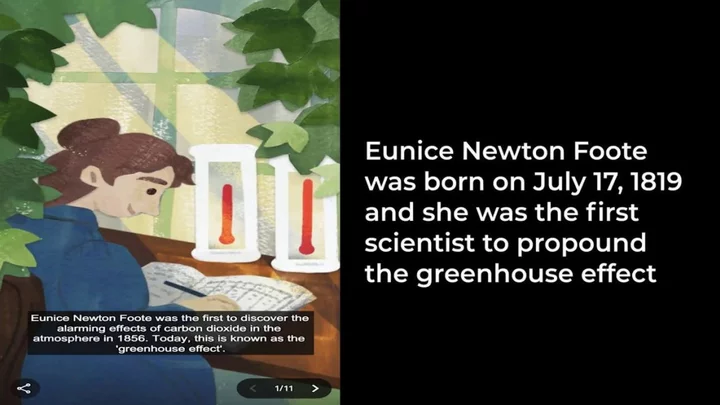We talk about climate change and the devastating effects of greenhouse gases on a daily basis, yet many of us have never heard of Eunice Newton Foote.
The American scientist was the first person to realise the alarming impact of carbon dioxide in the atmosphere, all the way back in 1856.
So, to mark what would have been her 204th birthday, Google has dedicated today’s Doodle to the environmental pioneer.
Head to the search engine and you’ll find an 11-part slideshow explaining Foote’s most significant work.
Sign up for our free Indy100 weekly newsletter
It goes on to point out that her research was largely ignored for almost 100 years, and credits her with being the first person to “plant a seed of interest in the issue of climate change”.
And for anyone wondering, her surname is no coincidence: her father was allegedly a distant relative of Sir Isaac Newton.
In a blurb to its Doodle, Google points out that whilst science was Foote’s lifelong passion, she also dedicated time to campaigning for women’s rights.
In 1848, she attended the first Woman’s Rights Convention in Seneca Falls, New York State and became the fifth signatory of the Declaration of Sentiments — which demanded equality for women in social and legal status.
Back then, women were largely shunned from the scientific community, but this didn’t stop Foote from conducting experiments on her own.
After placing mercury thermometers in glass cylinders, she noticed that the cylinder containing carbon dioxide heated up the most and took the longest to cool down.
As a result, she became the first scientist to draw a connection between rising CO2 levels and the warming of the atmosphere.
After publishing her findings, Foote wrote a second paper on atmospheric static electricity for the journal ‘Proceedings of the American Association for the Advancement of Science’.
These were the first two physics studies to be published by a woman in the US, as Google notes.
In 1856, a male scientist presented her work at the annual meeting of the American Association for the Advancement of Science. This then lead to further experiments which uncovered what is now known as the Greenhouse effect.
And whilst none of us relish the fact this phenomenon exists, we should be eternally grateful to Foote for flagging it to us, all those years ago.
Have your say in our news democracy. Click the upvote icon at the top of the page to help raise this article through the indy100 rankings.









